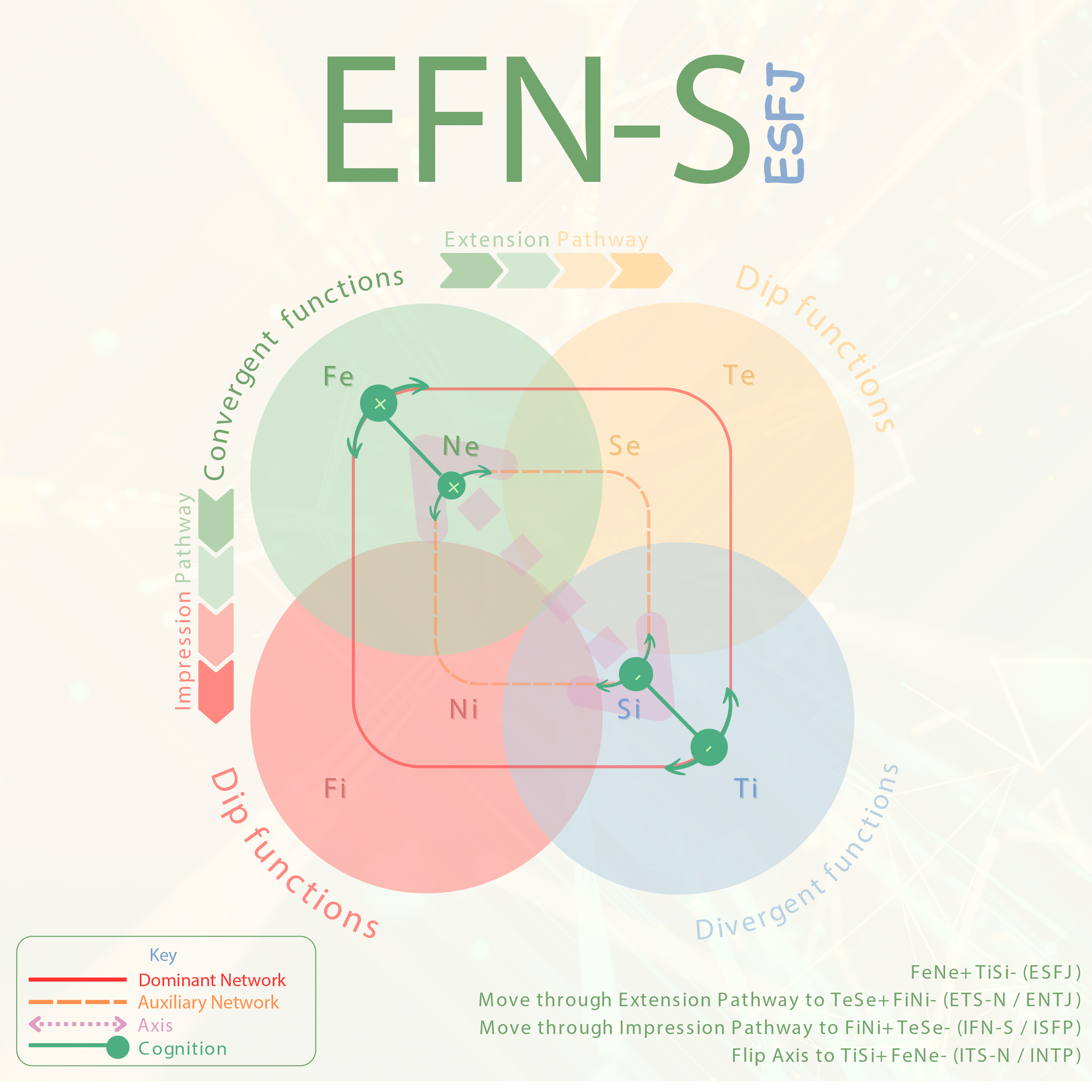
The ESFJ, also known as eFN in Cognitive Personality Theory (CPT), is a sociable and community-focused type characterised by their dominant Extraverted Feeling (Fe), agency Extraverted Intuition (Ne), authority Introverted Sensing (Si), and oppositional Introverted Thinking (Ti). This combination makes for someone who realises social potential across the contexts they are exposed to, whether it be an actual social situation or a sense of social responsibility, driven by precise and mechanistic rulesets of appropriate responses to countless variables.
Dominant Position: Extraverted Feeling (Fe)
As the dominant function, Extraverted Feeling (Fe) provides the ESFJ with a focus on external social variables and the emotional states of others. This function excels at creating harmony and fostering deep, authentic connections within their social environment.
How it Feels: For the ESFJ, Fe dominance means being constantly aware of the social landscape and how it can be harmonised. They are always seeking to connect with others on a meaningful level, making them highly empathetic and relational in their approach.
Agency Position: Extraverted Intuition (Ne)
In the agency position, Extraverted Intuition (Ne) provides the ESFJ with a natural curiosity and exploratory tendency. Ne is fast-switching and enables them to connect various social contexts together, ensuring they are always ready to discover new opportunities and possibilities.
How it Feels: With Ne as their agency function, ESFJs can effectively engage with their environment, exploring and connecting different social contexts. They invest their ego in their ability to innovate and adapt, making them dynamic and adventurous in their social pursuits.
Authority Position: Introverted Sensing (Si)
Introverted Sensing (Si) in the authority position acts as a guiding bedrock for the ESFJ, ensuring they have a consistent and reliable foundation. Si provides a sense of stability and tradition, helping them to maintain a steady and dependable environment.
How it Feels: Si in this position can feel like an internal anchor, constantly grounding the ESFJ in their core values and experiences. This function helps them maintain a clear sense of stability and order, ensuring that their actions are aligned with their long-term goals and needs.
Oppositional Position: Introverted Thinking (Ti)
In the oppositional position, Introverted Thinking (Ti) serves as a delicate yet essential function. Ti provides the ESFJ with a sense of internal logic and coherence, ensuring their actions are aligned with their inner values and principles. However, it can also be a source of tension as it generates solutions and rulesets that must be realised.
How it Feels: Ti in the oppositional position often feels like a subtle, yet powerful circuit board driving the ESFJ’s actions. While it can be a rigid and easily frustarted in the moment when expectations of what should logically follow are not met, it also ensues natural tact and reliability across most situations. This function encourages them to retain logical integrity even in the phase of emotional pressure from others to adopt their various viewpoints.
Cognitive Dynamics and Dip Functions
The ESFJ’s cognitive dynamics are characterised by their ability to leverage external social variables and take decisive action through Fe-Ne. This type excels at realising social potential across various environments, ensuring their goals are achieved efficiently and effectively.
Dips:
FeNe - TeSe: Cunning engagement of leverage points to complete a designated task to a high standard and realise one's social goals. This dip allows the ESFJ to use their dynamic presence and organisational skills to build strong relationships and advance in their chosen field.
FeNe - FiNi: Assimilation of the characteristics of impactful and likeable people into one's own synthesised identity towards greater charisma and social adaptability. This dip helps the ESFJ develop a robust understanding of key social factors that drive success, allowing them to navigate different contexts with ease.
TiSi - FiNi: Extending rehearsed rulesets into synthetic personal identity to correct one's mistakes and continue to grow sustainably. This dip helps the ESFJ gain a deeper understanding of their internal motivations and how they align with their broader goals.
Conclusion
The ESFJ (eFN) is perhaps the most initially versatile of the types, owing to their adaptability on both social and mechanistic fronts. Their dominant Extraverted Feeling (Fe) drives them to harmonise external social variables and take strategic action, while their agency Extraverted Intuition (Ne) ensures they remain curious and exploratory. The authority Introverted Sensing (Si) provides a consistent foundation, and the oppositional Introverted Thinking (Ti) ensures they remain true to their inner values. Together, these functions create a personality that excels at realising social potential and achieving ambitious goals, making them highly effective and dynamic leaders in their communities.
Illustrations by Rivka B.